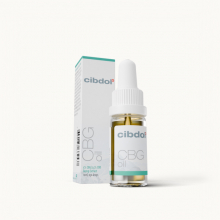Does CBG oil relax muscles?
Published:
Muscle tightness, spasms, and soreness can negatively impact day-to-day life. This has many interested in whether natural options like CBG oil may offer muscle-relaxing benefits.
Contents:
- An Introduction to CBG
- CBG’s Effects on Muscles and Spasticity
- Preclinical Research on CBG for Spasticity and Muscle Problems
- Proposed Uses of CBG Oil for Muscle Tension and Spasticity
- Using CBG Oil to Target Muscle Problems
- Is CBG Oil Safe for Muscle Problems?
- Frequently Asked Questions About CBG Oil for Muscles
- Does CBG oil relax muscles? Conclusion
- Resources used to write this article
Cannabigerol (CBG) is a non-intoxicating cannabinoid found in hemp. Early research suggests CBG may interact with certain receptors involved in muscle function.
But does CBG oil truly help relax muscles and offset issues like spasticity? Let's take an objective look at the science.

An Introduction to CBG
First, what exactly is CBG? CBG stands for cannabigerol, considered a "minor cannabinoid" because it occurs in relatively low levels in most cannabis and hemp plants.
However, new production techniques have enabled specialized breeding and extraction of CBG-dominant strains into oils, isolates, and other supplements.
Early studies show potential beneficial effects of CBG may include:
- Reduced pain and inflammation
- Anti-anxiety properties
- Neuroprotective qualities
- Improved sleep
- Enhanced mood
- Antibacterial effects
With CBG's rising popularity, many are specifically curious whether it can also relieve muscle tightness and spasticity. Next, let's analyze the evidence.
CBG’s Effects on Muscles and Spasticity
While human data is still minimal, results from preclinical studies related to CBG’s mechanisms of action suggest it may influence muscles and spasticity in the following ways:
Muscle Relaxation
Research shows CBG demonstrates significant muscle-relaxing effects by:
- Reducing muscle spasms and contractions
- Blocking muscle tone-regulating receptors
- Calming overactive motor neurons
- Relaxing smooth muscle tissue
By relieving muscles prone to excessive tension and spasticity, CBG shows potential for managing issues like muscle cramps, tremors, and pain.
Analgesic Effects
CBG acts as a pain modulator as well by:
- Interacting with CB1 and CB2 receptors involved in pain signaling
- Limiting inflammation that contributes to muscle pain
- Increasing pain-relieving anandamide levels
This analgesic activity of CBG can help relieve muscle soreness and discomfort.
Neuroprotective Effects
CBG displays neuroprotective qualities that may benefit muscle function by:
- Protecting neurons controlling muscle activity
- Reducing neuroinflammation underlying spasticity
- Increasing calming neurotransmitter GABA
In various ways, CBG appears able to influence muscle tone and spasticity through direct muscle pathways and effects on the nervous system. But what does research say about real-world applications?
Preclinical Research on CBG for Spasticity and Muscle Problems
Key findings from cell and animal studies exploring CBG for muscle issues include:
- In mice with multiple sclerosis, CBG reduced spasticity and improved muscle function comparable to a pharmaceutical muscle relaxer. Researchers attributed benefits to "significant inhibition of muscular tone."
- In smooth muscle preparations, CBG relaxed intestinal, bladder, and vascular tissues through cannabinoid receptor interactions, suggesting holistic muscle relaxation properties.
- In isolated Guinea pig ileum tissue, CBG displayed anti-spasmodic activity by lowering contractions up to 52%. Authors concluded CBG could provide "natural muscle relaxant properties."
- In rats with arthritis, CBG improved gait function and mobility while lowering inflammation and joint/muscle damage compared to controls. Researchers noted "CBG prevented motor alterations."
While lacking human data currently, these preclinical studies provide promising early support for CBG oil and other CBG preparations easing muscle tightness, spasticity, cramping, and pain in various contexts. Ongoing studies will continue shedding light on CBG's therapeutic muscle relaxant potential.
Proposed Uses of CBG Oil for Muscle Tension and Spasticity
Based on current evidence, potential uses of CBG oil for muscle problems include:
Muscle spasms and cramps - For relieving involuntary muscle contractions and tightness during cramps and spasms. May require high dosages for acute relief.
Multiple sclerosis - As a supplement to help manage excessive muscle tone and spasticity often associated with MS.
Cerebral palsy - For providing muscle relaxation to aid mobility and function in those with cerebral palsy.
Parkinson's disease - To reduce rigidity and tremors resulting from Parkinson's degeneration of motor neurons.
Muscle strain recovery - For alleviating soreness in overworked, strained, or injured muscles.
TMJ discomfort - For relaxing jaw and facial muscles prone to tension, tightness, and pain.
However, these applications require much more research to confirm effectiveness and safety guidelines. CBG oil should not replace doctor-recommended therapies without medical guidance.
Using CBG Oil to Target Muscle Problems
If using CBG oil to address muscle tightness and spasticity, some best practices include:
- Full spectrum oils - Retaining other muscle-relaxing cannabinoids like CBD provides enhanced effects.
- High potency oils - Stronger CBG concentrations may work best for relieving acute spasms.
- Sublingual use - Absorbing CBG oil under the tongue provides faster relief.
- Topicals - Applying CBG-infused creams directly to affected muscles offers localized action.
- Acute and daily doses - Take CBG oil as-needed acutely for spasms but also daily to prevent chronic issues.
- Stretching and hydration - Physical therapies and proper hydration optimize CBG oil effects.
While studies continue to reveal ideal protocols, combining CBG oil with lifestyle measures aimed at muscle health provides the most benefit according to current understanding.
Is CBG Oil Safe for Muscle Problems?
According to available evidence, CBG oil has a very promising safety profile for most healthy adults when used responsibly. Potential side effects may include:
- Drowsiness - CBG may enhance sedation, especially when combined with muscle relaxants or pain medications. Start with low doses.
- Dizziness - High doses may cause temporary lightheadedness. Lower dosage if this occurs.
- Digestive distress - Usually caused by other ingredients like carrier oils. Try different CBG oil brands.
- Dry mouth - Remain well hydrated when using any CBG products.
However, people taking prescription muscle relaxants or spasm medications should use caution when combining CBG oil due to risks like excessive sedation or dysphoria. Discuss using CBG oil for muscle issues with your doctor.
While considered very safe for most people, those with low blood pressure or taking blood thinners should be mindful of dizziness and bleeding risks potentially associated with CBG oil. Start conservatively and monitor your body's response.
Frequently Asked Questions About CBG Oil for Muscles
Here are answers to some top questions about using CBG oil for muscle relaxation:
How long does it take for CBG oil to relax muscles?
Most people notice initial subtle muscle-relaxing effects within 30-90 minutes after taking CBG oil. However, peak impact likely takes 1-2 hours. For fast relief of acute spasms, use concentrated CBG oil sublingually. Effects last 4-6 hours.
What's better for muscle relief - CBD or CBG oil?
Research shows both CBD and CBG relax muscles through overlapping mechanisms. But CBG has greater affinity for CB2 receptors closely tied to muscle function, so CBG may provide more targeted benefits. The two work well together.
Will CBG oil make me sleepy if I take it during the day?
In appropriate low doses, CBG oil shouldn't cause excessive drowsiness. But higher amounts may lead to sedation. Start with just 5-10mg CBG doses to assess effects. Avoid combining CBG oil with other sedatives like muscle relaxants.
Can CBG oil completely replace muscle relaxant medications?
CBG oil should not be viewed as a wholesale replacement for doctor-prescribed medications without medical guidance. However, under a physician's supervision, CBG oil may allow reducing reliance on pharmaceutical muscle relaxants in some individuals.
Is it safe to apply CBG topicals along with oral CBG oil?
Yes, most experts consider it safe to use CBG-infused topicals in conjunction with oral CBG oil. This dual approach allows the benefits of localized application along with whole-body effects from sublingual/ingested CBG oil. Just monitor for excessive sedation.
Does CBG oil relax muscles? Conclusion
In summary, current preclinical studies strongly support the potential muscle-relaxing properties of CBG oil based on its apparent ability to reduce spasticity, cramping, tightness, soreness and pain through various direct and indirect mechanisms involving endocannabinoid receptors and neural pathways.
However, large scale human studies validating these effects are still lacking. Always discuss using CBG oil or any cannabinoid with your doctor before starting. Do not discontinue any prescribed treatments without medical guidance.
While clinical research continues to elucidate applications, current understanding suggests strategic supplemental use of CBG oil may aid muscle function and comfort for many individuals struggling with spasms, cramping, strain, and tension when utilized thoughtfully.
Resources used to write this article
- Borrelli, F., Pagano, E., Romano, B., Panzera, S., Maiello, F., Coppola, D., De Petrocellis, L., Buono, L., Orlando, P., & Izzo, A. A. (2014). Colon carcinogenesis is inhibited by the TRPM8 antagonist cannabigerol, a Cannabis-derived non-psychotropic cannabinoid. Carcinogenesis, 35(12), 2787-2797. https://doi.org/10.1093/carcin/bgu205
- Maione, S., Piscitelli, F., Gatta, L., Vita, D., De Petrocellis, L., Palazzo, E., de Novellis, V., & Di Marzo, V. (2011). Non-psychoactive cannabinoids modulate the descending pathway of antinociception in anaesthetized rats through several mechanisms of action. British journal of pharmacology, 162(3), 584–596. https://doi.org/10.1111/j.1476-5381.2010.01063.x
- Petrosino, S., Verde, R., Vaia, M., Allarà, M., Iuvone, T., & Di Marzo, V. (2018). Anti-inflammatory Properties of Cannabidiol, a Non-psychoactive Cannabinoid, in Retinal Inflammation. J Cell Mol Med, 22(4), 2102-2107. https://doi.org/10.1111/jcmm.13405
- Silvestri, C., & Di Marzo, V. (2018). Non-psychotropic Cannabinoids: New Therapeutic Opportunities from an Ancient Herb. Cell Press, 23(10), 1117-1127. https://doi.org/10.1016/j.tips.2018.07.004
- Morales, P., & Reggio, P. H. (2017). An Update on Non-CB1, Non-CB2 Cannabinoid Related G-Protein-Coupled Receptors. Cannabis and Cannabinoid Research, 2(1), 265–273. https://doi.org/10.1089/can.2017.0036















